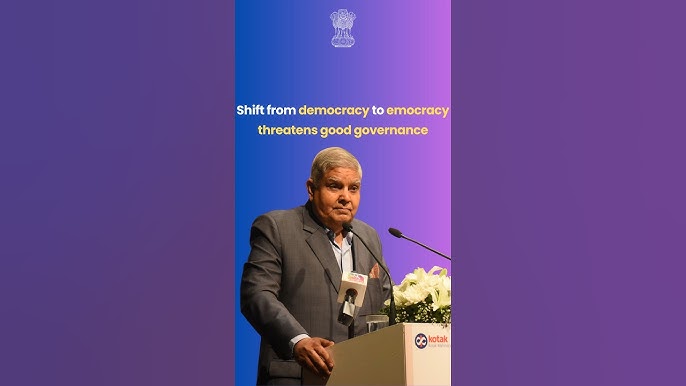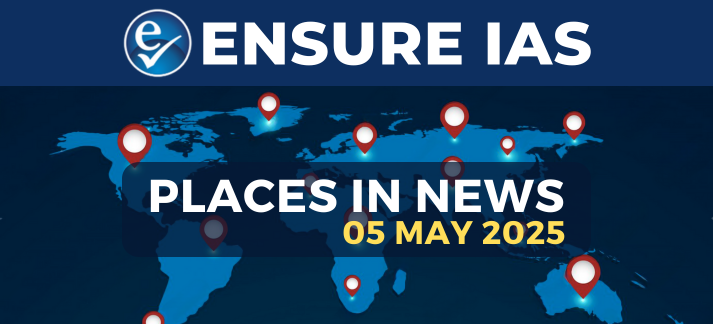- Courses
- GS Full Course 1 Year
- GS Full Course 2 Year
- GS Full Course 3 Year
- GS Full Course Till Selection
- Online Program
- GS Recorded Course
- NCERT (Recorded 500+ Hours)
- Polity Recorded Course
- Geography Recorded Course
- Economy Recorded Course
- AMAC Recorded Course
- Modern India, Post Independence & World History
- Environment Recoded Course
- Governance Recoded Course
- Science & Tech. Recoded Course
- International Relations and Internal Security Recorded Course
- Disaster Management Module Course
- Ethics Recoded Course
- Essay Recoded Course
- Current Affairs Recoded Course
- CSAT
- 5 LAYERED ARJUNA Mentorship
- Public Administration Optional
- ABOUT US
- OUR TOPPERS
- TEST SERIES
- FREE STUDY MATERIAL
- VIDEOS
- CONTACT US
From Democracy to Emocracy: Understanding the Shift
From Democracy to Emocracy: Understanding the Shift
05-05-2025

- Democracy, by definition, is a system where people either directly or indirectly take part in decision-making through elected representatives.
- Traditionally, democratic processes are based on reasoned debates, informed citizens, expert advice, and evidence-based policymaking.
- However, there is a visible shift from rational governance to what is now being called "Emocracy"—a system where decisions are increasingly driven by emotions, viral trends, and public sentiment.
- Emocracy combines emotion with democracy, where policies are often influenced by psychological persuasion, mass appeal, and reactionary public opinion.
- This trend is evident globally, seen in the rise of emotionally charged campaigns like Brexit in the UK, Trump’s election in the US, and nationalist waves in Europe.
What Is Driving This Shift?
Several structural and cultural transformations are accelerating this shift:
- Social Media Sensationalism: Platforms like Facebook, Twitter, and Instagram amplify emotional content. Sensationalism, outrage, and fear go viral more quickly than facts or policy discussions. Studies (MIT Media Lab, 2018) show that false news spreads six times faster than the truth online.
- Decline of Traditional Media: Print and broadcast media, once the gatekeepers of verified information, are increasingly being replaced by digital platforms that lack editorial scrutiny. This weakens public trust and gives rise to echo chambers that prioritize emotional alignment over accuracy.
- Emotionally Framed Political Messaging: Political campaigns are now crafted with a strong emotional narrative—whether invoking past injustices, national pride, or religious identity. The rational, manifesto-based appeal has largely given way to sentimental mobilization.
- Identity Politics Over Policy Politics: Elections today are often fought on lines of caste, religion, or regional identity. Vote banks are created and maintained by invoking emotional connections, sidelining larger policy frameworks.
- Populism over Prudence: Short-term populist measures like free electricity, farm loan waivers, or cash transfers attract voters but often ignore long-term sustainability. These decisions are made to appeal emotionally rather than address structural concerns.
- Erosion of Rational Discourse: Emotional rhetoric increasingly dominates TV debates, political rallies, and online discussions. Expert opinions are dismissed as elitist or out of touch, and dissent is often labeled anti-national.
- Media’s Role in Fear and Outrage: The rise of 24x7 news cycles and TRP-driven journalism has turned public discourse into a spectacle. News is curated to invoke outrage or fear rather than facilitate informed debate.
- Pressure on Institutions: Even independent institutions like the Election Commission, judiciary, and civil services face pressure to align with popular sentiment. This endangers their objectivity and undermines institutional checks and balances.
Democracy vs. Emocracy – A Comparative View
|
Feature |
Democracy |
Emocracy |
|
Decision-Making |
Rational, evidence-based |
Emotion-driven, impulsive |
|
Political Leadership |
Accountable, policy-focused |
Charismatic, populist |
|
Public Engagement |
Informed debate |
Sentiment-driven reactions |
|
Media Influence |
Free press, investigative |
Sensationalism, misinformation |
|
Long-Term Governance |
Stability, institutional continuity |
Short-term, reactionary policies |
What Are the Consequences of Emotion-Driven Governance?
- Populist leaders tend to make decisions based on emotional appeal rather than policy merit, which can destabilize state finances.
- Example: Farm loan waivers in Punjab and Maharashtra were announced due to protests, but RBI (2023) data revealed that less than 30% of small farmers benefited, while state budgets suffered.
- Laws created in haste often lack legal scrutiny, causing long-term complications.
- Example: Demonetization (2016), introduced as an emotional strike against black money, caused significant job losses and economic disruption, with NSSO data (2018) showing 1.5 million informal sector job losses.
- Emotion-based welfare schemes can strain state resources.
- Example: Free electricity schemes in Delhi and Punjab led to power sector debts, as per a 2021 CAG report, limiting infrastructure investment.
- Emotionally polarizing laws may result in protests and unrest.
- Example: Citizenship Amendment Act (2019) triggered nationwide protests over religious discrimination fears, delaying NRC implementation.
- Reactionary decisions may lack preparedness.
- Example: The sudden COVID-19 lockdown in 2020 left millions of migrant workers stranded. CMIE (2021) reported 75 million job losses due to unplanned execution.
- In contrast, countries like Germany and South Korea executed phased lockdowns with social security measures to minimize disruption.
Are Emotions Always Harmful in Policy? Can Emotions Ever Be Constructive in Policy?
- While excessive emotional influence can derail rational governance, emotions can also bring about social justice and reform.
- Reservation policies for SCs, STs, and OBCs have improved education and social mobility, as noted in NITI Aayog’s 2023 report.
- Quick emotional responses in crises can ensure timely support and relief.
- Example: PM Garib Kalyan Yojana provided relief to 80 million people during the pandemic, ensuring food and financial support.
- Emotional narratives can foster national unity and pride.
- Example: Swachh Bharat Abhiyan inspired behavior change, leading to a 60% fall in rural open defecation (UNICEF, 2021).
- Emotionally engaging campaigns often enhance public health outcomes.
- Example: India’s Polio Eradication Campaign used celebrity outreach and community drives to eliminate polio by 2014.
- Gender-focused emotional policies can address deep-rooted biases.
- Beti Bachao Beti Padhao (BBBP) campaign helped boost girl child enrolment and curb female infanticide in selected districts.
- Conservation efforts are also fueled by emotionally engaging campaigns.
- Example: Project Tiger emotionally connected with the public and led to an increase in tiger population from 1,411 (2006) to 3,167 (2022).
The Way Forward
To safeguard democratic institutions and ensure effective governance, a balance must be struck between empathy and evidence.
- Governance must return to a foundation of data, research, and evidence.
- Example: Kerala’s Nava Keralam Mission uses real-time analytics to improve health and education outcomes.
- Social media platforms need regulation to curb misinformation without compromising free speech.
- There is a need to restore reasoned public debate through universities, civil societies, and think tanks.
- Policy proposals must undergo institutional scrutiny and long-term impact analysis.
- Example: The FRBM Act ensures fiscal discipline and guards against populist spending.
- The 2nd Administrative Reforms Commission recommended establishing Impact Assessment Committees to evaluate the long-term consequences of proposed laws and schemes before implementation.
|
Also Read |
|
| FREE NIOS Books | |



